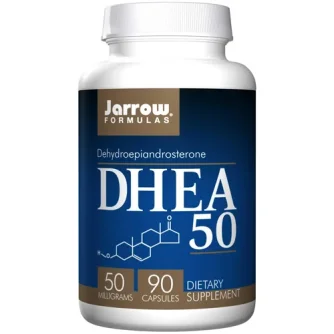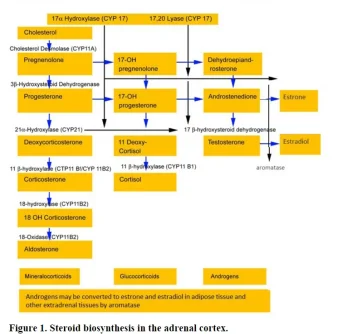Nelson Vergel
Founder, ExcelMale.com
Dehydroepiandrosterone (DHEA)

DHEA is a steroid prohormone produced by the adrenal glands and transformed in target tissue through intracrine mechanisms to androgens or estrogens. Plasma DHEA levels decline with age. By the age of 70–80 years, levels may be as low as 10%–20% of those encountered in young individuals.
The importance of DHEA in steroid hormone production increases with age. Indeed, in postmenopausal women, production of estrogens by the ovaries declines dramatically, making the adrenals the only source of steroid hormones through DHEA. In men, although T secretion by the testicles continues late into life, T levels progressively decline, and DHEA's importance in steroid hormone production is also higher with increasing age. DHEA's effect is mostly through its hormone end products.
Nevertheless, in vitro studies have shown that DHEA may directly increase nitric oxide production from intact endothelial cells, probably through G protein-dependent activation of endothelial nitric oxide synthetase, thus supporting proper intrinsic physiological functions.
Effects of DHEA decline on the aging process and age-related diseases
DHEA decline with age is clinically relevant and has been related to a variety of age-related conditions. A positive relationship between DHEA levels and muscle mass, muscle strength, as well as mobility and a lower risk for falls, has been described in elderly individuals. Moreover, a positive effect of DHEA on BMD through transformation to estrogens (in vitro human osteoblasts present an aromatase activity),but also directly through mitogen-activated protein kinase signaling pathways, has been suggested. Indeed, DHEA levels have been positively related to BMD in women and men.
Concerning neuropsychiatric diseases, the relationship between DHEA and cognitive disorders has not been studied sufficiently in order to formally conclude on its effect on dementia onset and progression. On the other hand, the relationship between DHEA levels and mood disorders seems clearer. Low levels of DHEA have been related to depression symptoms.
The relationship between DHEA levels and cardiovascular disease risk factors such as cholesterol and glucose tolerance is inconsistent. Nevertheless, studies have shown that low DHEA levels are related to a higher risk for atherosclerosis,heart failure,cardiovascular complications, and overall mortality.
DHEA seems to play a rather important role in sexual function for both sexes. Low levels of DHEA were related to a higher risk for erectile dysfunction in men and low sexual responsiveness in women.
Efficiency and safety of DHEA supplementation
DHEA administration has had positive effects on muscle mass and strength, as well as physical performance parameters.Also, DHEA has had positive effects on BMD both in women and in men. Furthermore, DHEA supplementation has shown positive effects on mood as well as sexual function both for men and for women. However, no positive effects on erectile function were found when conditions such as diabetes or neurological disorders were present. Finally, DHEA supplementation has improved menopause symptoms in perimenopausal and early postmenopausal women. Also, intravaginal formulations have had a positive effect in reversing vaginal mucosa atrophy in postmenopausal women.
Most studies show a very satisfying safety profile for DHEA supplementation. Only minimal effects such as mild acne, seborrhea, facial hair growth, and ankle swelling have been reported in women. Otherwise, DHEA supplementation has had a rather positive effect on skin. No significant effect has been reported on hormone-dependent tumors such as breast and prostate cancer. On the contrary, animal studies showed that DHEA inhibits tumors of lymphatic tissue, lung, colon, breast, liver, and skin. Nevertheless, to our knowledge, the longest study durations for DHEA supplementation did not exceed 2 years. Consequently, no data exist on treatment safety regarding hormone-dependent tumors (breast, prostate, and endometrium), cardiovascular risk, or mortality for longer treatments.
Future perspectives of DHEA supplementation
DHEA has the status of a dietary supplement and is sold over the counter in the US. In Europe, in most countries it is either forbidden (France) or subject to medical prescription (Switzerland, Canada). DHEA is widely used in antiaging medicine and is considered as a “fountain of youth” hormone by some. As it is a prohormone, it is also used as a “hormone regulator”, permitting the body to reach a hormone equilibrium. DHEA is indeed a prohormone with positive effects on several age-related diseases. Supplementing a prohormone is also extremely interesting, as it would theoretically provide the organism with the possibility to use it and transform it according to local and general hormone needs. For the future, the role of DHEA supplementation in specific indications such as sarcopenia, falls and rehabilitation protocols, osteoporosis, mood and cognitive disorders, and also sexual well- being needs to be better studied in longer and larger studies. Finally, physicians prescribing DHEA should consider and inform their patients of the fact that long-term effects concerning efficiency, but also safety, are still uncertain.
Source: Off-label use of hormones as an antiaging strategy: a review. Nikolaos Samaras et al. Clinical Interventions in Aging 2014:9 1175-8211;1186
 www.ncbi.nlm.nih.gov
www.ncbi.nlm.nih.gov


DHEA is a steroid prohormone produced by the adrenal glands and transformed in target tissue through intracrine mechanisms to androgens or estrogens. Plasma DHEA levels decline with age. By the age of 70–80 years, levels may be as low as 10%–20% of those encountered in young individuals.
The importance of DHEA in steroid hormone production increases with age. Indeed, in postmenopausal women, production of estrogens by the ovaries declines dramatically, making the adrenals the only source of steroid hormones through DHEA. In men, although T secretion by the testicles continues late into life, T levels progressively decline, and DHEA's importance in steroid hormone production is also higher with increasing age. DHEA's effect is mostly through its hormone end products.
Nevertheless, in vitro studies have shown that DHEA may directly increase nitric oxide production from intact endothelial cells, probably through G protein-dependent activation of endothelial nitric oxide synthetase, thus supporting proper intrinsic physiological functions.
Effects of DHEA decline on the aging process and age-related diseases
DHEA decline with age is clinically relevant and has been related to a variety of age-related conditions. A positive relationship between DHEA levels and muscle mass, muscle strength, as well as mobility and a lower risk for falls, has been described in elderly individuals. Moreover, a positive effect of DHEA on BMD through transformation to estrogens (in vitro human osteoblasts present an aromatase activity),but also directly through mitogen-activated protein kinase signaling pathways, has been suggested. Indeed, DHEA levels have been positively related to BMD in women and men.
Concerning neuropsychiatric diseases, the relationship between DHEA and cognitive disorders has not been studied sufficiently in order to formally conclude on its effect on dementia onset and progression. On the other hand, the relationship between DHEA levels and mood disorders seems clearer. Low levels of DHEA have been related to depression symptoms.
The relationship between DHEA levels and cardiovascular disease risk factors such as cholesterol and glucose tolerance is inconsistent. Nevertheless, studies have shown that low DHEA levels are related to a higher risk for atherosclerosis,heart failure,cardiovascular complications, and overall mortality.
DHEA seems to play a rather important role in sexual function for both sexes. Low levels of DHEA were related to a higher risk for erectile dysfunction in men and low sexual responsiveness in women.
Efficiency and safety of DHEA supplementation
DHEA administration has had positive effects on muscle mass and strength, as well as physical performance parameters.Also, DHEA has had positive effects on BMD both in women and in men. Furthermore, DHEA supplementation has shown positive effects on mood as well as sexual function both for men and for women. However, no positive effects on erectile function were found when conditions such as diabetes or neurological disorders were present. Finally, DHEA supplementation has improved menopause symptoms in perimenopausal and early postmenopausal women. Also, intravaginal formulations have had a positive effect in reversing vaginal mucosa atrophy in postmenopausal women.
Most studies show a very satisfying safety profile for DHEA supplementation. Only minimal effects such as mild acne, seborrhea, facial hair growth, and ankle swelling have been reported in women. Otherwise, DHEA supplementation has had a rather positive effect on skin. No significant effect has been reported on hormone-dependent tumors such as breast and prostate cancer. On the contrary, animal studies showed that DHEA inhibits tumors of lymphatic tissue, lung, colon, breast, liver, and skin. Nevertheless, to our knowledge, the longest study durations for DHEA supplementation did not exceed 2 years. Consequently, no data exist on treatment safety regarding hormone-dependent tumors (breast, prostate, and endometrium), cardiovascular risk, or mortality for longer treatments.
Future perspectives of DHEA supplementation
DHEA has the status of a dietary supplement and is sold over the counter in the US. In Europe, in most countries it is either forbidden (France) or subject to medical prescription (Switzerland, Canada). DHEA is widely used in antiaging medicine and is considered as a “fountain of youth” hormone by some. As it is a prohormone, it is also used as a “hormone regulator”, permitting the body to reach a hormone equilibrium. DHEA is indeed a prohormone with positive effects on several age-related diseases. Supplementing a prohormone is also extremely interesting, as it would theoretically provide the organism with the possibility to use it and transform it according to local and general hormone needs. For the future, the role of DHEA supplementation in specific indications such as sarcopenia, falls and rehabilitation protocols, osteoporosis, mood and cognitive disorders, and also sexual well- being needs to be better studied in longer and larger studies. Finally, physicians prescribing DHEA should consider and inform their patients of the fact that long-term effects concerning efficiency, but also safety, are still uncertain.
Source: Off-label use of hormones as an antiaging strategy: a review. Nikolaos Samaras et al. Clinical Interventions in Aging 2014:9 1175-8211;1186
Dehydroepiandrosterone and Erectile Function: A Review - PMC
To review the contemporary knowledge regarding the dehydroepiandrosterone and erectile function. Medline was reviewed for English-language journal articles spanning the time between January 1990 and December 2017, using the terms ‘erectile ...
Last edited by a moderator:















